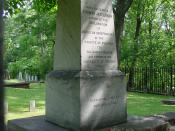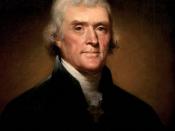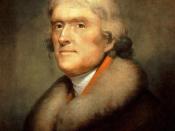The Jeffersonian Era of Contradiction When assessing whether Thomas Jefferson's performance in presidential office contradicted his philosophical utterances when he was not in office, one finds that though Jefferson meant well for the young country, in order for him to improve the countries stability and strength, he had to compromise many of his personal convictions and beliefs.
Thomas Jefferson was the third president of the United States and foremost spokesman for democracy of the day. While serving as president, Jefferson took the steps necessary to strengthen many of the powers of the executive branch of the federal government. This step might seem to be opposite of his strategy of Jeffersonian democracy. Thomas Jefferson had hoped and strived for democracy ruled by the common people of the country. Eventually though he saw that at this time, the country could not survive and flourish being led by the unschooled and compulsive majority that was the American people.
Jefferson found that he must change the government into an opposite form of rule than he had originally hoped and worked for, in order to protect the people from themselves.
When running for President of the United States of America, one of Thomas Jefferson's main campaign pledges was to enlighten and educate the public of the newly formed nation. Thomas Jefferson himself came from a wealthy family, who took his education quite seriously. Jefferson went on to study mathematics, natural history, metaphysics, and philosophy at the College of William and Mary under Dr. William Small. Jefferson studied and learned throughout his life with a keen interest in the new scientific theory of inoculation. He actually inoculated himself against smallpox. Education was a luxury which the privileged and wealthy provided for their sons. Jefferson longed for a public education system in the new country for...


